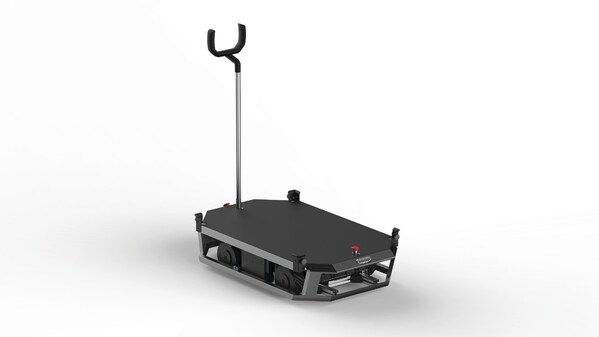Lifestyle
Schaeffler Wins Red Dot Award for Innovative GraviKart Design

Schaeffler has been honored with the prestigious Red Dot Design Award for its innovative transport concept, the GraviKart. This award, announced on October 16, 2025, recognizes GraviKart in the “Design Concept 2025” category, highlighting its significant contribution to industrial robotics.
The GraviKart is an autonomous robotic push trolley designed specifically for shop floor environments. It enhances collaboration in industrial manufacturing and logistics by combining advanced functionality with intelligent social behaviors. This innovation aims to assist workers by alleviating the physical demands of moving heavy loads in tight spaces.
Innovative Features Enhance Workplace Efficiency
Equipped with a compact, modular design, GraviKart utilizes integrated cameras for autonomous navigation and obstacle detection. The system is further enhanced by sensitive haptic and AI-based voice recognition technologies, allowing it to interpret human gestures and respond with visual signals through built-in LED lights. This capability fosters a safe and collaborative human-machine interaction.
“We are proud to receive the Red Dot Design Award,” said Han Boon Siew, Senior Director at Schaeffler Hub for Advanced Research and Innovation Subcluster Manager for Humanoids. “As one of the most prestigious international design competitions, this recognition underscores our team’s dedication to developing intelligent solutions that drive progress in motion.”
Advancements in Humanoid Robotics
The development of GraviKart is part of Schaeffler’s global research initiative known as the Hub for Advanced Research (SHARE) program. This initiative collaborates with leading universities worldwide, facilitating a collaborative approach that combines the expertise of Schaeffler employees with academic research. Such cooperation accelerates the transfer of knowledge into practical product development.
Winning the Red Dot Design Award not only marks a significant milestone for Schaeffler but also emphasizes the company’s commitment to advancing humanoid robotics. These innovations are expected to play a vital role in the future of industrial efficiency, seamlessly integrating into existing factory environments.
With experience using humanoid robots in its own operations, Schaeffler possesses valuable insights into the precise component requirements of these systems. The company leverages its extensive expertise in manufacturing key components—including bearings, actuators, and sensors—to create scalable solutions that bridge automotive and industrial sectors with humanoid robotics.
The GraviKart is designed to facilitate effective communication between employees and robots, equipped with intelligent systems capable of listening, speaking, and visual recognition. Its compact and modular design allows for three distinct configurations tailored for transporting tools, parts, and KLT boxes with precision and safety. The knowledge gained from GraviKart’s development will also inform advancements in the rapidly evolving field of humanoid robotics.
-

 World5 months ago
World5 months agoSouth Korea’s Foreign Minister Cho Hyun to Visit China This Week
-

 Business5 months ago
Business5 months agoStarling Bank Plans Secondary Share Sale, Targeting $5.4 Billion Valuation
-

 Top Stories5 months ago
Top Stories5 months agoMunsang College Celebrates 100 Years with Grand Ceremony
-

 World5 months ago
World5 months agoPAS Aims to Expand Parliamentary Influence in Upcoming Election
-

 Business7 months ago
Business7 months agoKenvue Dismisses CEO Thibaut Mongon as Strategic Review Advances
-

 Lifestyle6 months ago
Lifestyle6 months agoHumanism Camp Engages 250 Youths in Summer Fest 2025
-

 Sports6 months ago
Sports6 months agoDe Minaur Triumphs at Washington Open After Thrilling Comeback
-

 Sports7 months ago
Sports7 months agoTupou and Daugunu Join First Nations Squad for Lions Clash
-

 Top Stories7 months ago
Top Stories7 months agoColombian Senator Miguel Uribe Shows Signs of Recovery After Attack
-

 World7 months ago
World7 months agoASEAN Gears Up for Historic Joint Meeting of Foreign and Economic Ministers
-

 Health6 months ago
Health6 months agoNew Study Challenges Assumptions About Aging and Inflammation
-

 Business7 months ago
Business7 months agoOil Prices Surge Following New EU Sanctions on Russia









